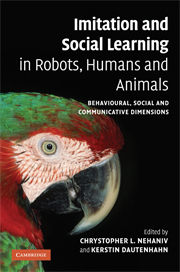 Imitation and Social Learning in Robots, Humans and Animals
Imitation and Social Learning in Robots, Humans and Animals Published online by Cambridge University Press: 10 December 2009
Imitation plays an important part in social and cognitive development of humans and possibly could also do so for artifacts (Dautenhahn, 1995). This section is concerned with issues of embodiment and development of imitative capabilities in infants, people with autistic spectrum disorder and robots. The first chapter links, in a developmental sense, the imitation of body movements to learning about the meaning of actions and mental states of others, a prerequisite for the transmission and communication of mental states (‘mind-reading’). Studying imitation skills in people with autistic spectrum disorders, who show impairments in social understanding and imitation, is hoped to shed light on the role of imitation in social cognition. The second chapter discusses a four-stage model of imitative abilities in infants in the context of a formal framework aimed at implementing robotic imitators. The stages range through learning about controlling one's own body, to imitation of body movements and actions on objects, to learning about inferring others' intentions and goals. The final chapter addresses the correspondence problem that robotic imitators need to solve when mapping observed behaviour (of possibly dissimilarly embodied models) to their own behaviours. In simulation studies conditions of synchrony, perceptual and proprioceptive matching, as well as cultural transmission of skills are investigated. Moreover, the bodies of the imitators may also grow and change, and the effect of this is studied. The three chapters range from developmental studies with humans to interdisciplinary work on robotic imitators inspired by developmental models and approaches.
To save this book to your Kindle, first ensure [email protected] is added to your Approved Personal Document E-mail List under your Personal Document Settings on the Manage Your Content and Devices page of your Amazon account. Then enter the ‘name’ part of your Kindle email address below. Find out more about saving to your Kindle.
Note you can select to save to either the @free.kindle.com or @kindle.com variations. ‘@free.kindle.com’ emails are free but can only be saved to your device when it is connected to wi-fi. ‘@kindle.com’ emails can be delivered even when you are not connected to wi-fi, but note that service fees apply.
Find out more about the Kindle Personal Document Service.
To save content items to your account, please confirm that you agree to abide by our usage policies. If this is the first time you use this feature, you will be asked to authorise Cambridge Core to connect with your account. Find out more about saving content to Dropbox.
To save content items to your account, please confirm that you agree to abide by our usage policies. If this is the first time you use this feature, you will be asked to authorise Cambridge Core to connect with your account. Find out more about saving content to Google Drive.